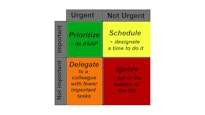What Is a Good Work Ethic?
- What Does ‘Work Ethic’ Mean?
- Why Are Good Work Ethics Important to Develop?
empty
empty
- Top 9 Values to Develop in the Workplace
empty
empty
empty
empty
empty
empty
empty
empty
empty
- Final Thoughts
What Does ‘Work Ethic’ Mean?
Ethics are sets of behavioral values held by a group of people that ensure the protection of their collective growth and survival.
In the context of employment, good work ethics ensure an organization survives, grows and progresses. They are measurable values, made visible through the daily decisions of those who work together towards the company’s common goals.
As 'work ethic' is such a broad term, it is important to break it down to demonstrate how upholding certain values drives your career.
Work ethics define not just what you do, but how you do it and the way you respond to challenges as they arise.
The visibility of your work ethic depends on your translation of company values into actions.
For example,
- You can show that you value reliability by showing up on time and meeting deadlines.
- Integrity is demonstrable by being transparent about your actions and mistakes.
- Curiosity translates into taking the initiative to learn and ask questions or bring new ideas to the table.
The simple test of a good work ethic is this:
Whether, if a whole team took the same action (for example, always blaming mistakes on another team member), that action would actively contribute to or go against the survival and success of the organization.
If the answer is that it would contribute, then that value forms part of a strong work ethic.
However, in the example, it would not.
Blame arises from dishonesty. But if the whole team were committed to owning up to mistakes, that would contribute to the organization’s success – honesty is a good work ethic upheld by the company.
Whatever core values your company upholds, it is important to consider how you can make your unique work ethic visible through your actions to reciprocate the trust a company has shown by employing you.
Why Are Good Work Ethics Important to Develop?
Everyone has a work ethic, regardless of whether or not they have paid conscious attention to developing it.
Your values are probably more visible to your employer than to you, so it is important to think about how your professional choices and habits come across to others and impact on your work.
Making a good impression is only the first step in integrating a strong work ethic into your daily life.
Employees who consistently demonstrate a commitment to their own values while upholding the core work ethics of their organization are, generally, consistently rewarded for their positive impact.
If you can translate your organization’s values into consistent, impactful actions, you are likely to become a role model and lead others to do the same.
Developing a strong work ethic is key to furthering your career.
Upholding your and the company’s values with consistent and impactful actions every day shows you are committed to the goals of the organization as much as you are to your own.
Your CV should list values that you have worked to uphold throughout your career, provided these are backed up with actions that have had a measurable effect.
Your attitude to work is key to building positive relationships with your teams, and improving productivity and outcomes.
Arriving at work with a positive attitude, a will to improve and an honest intention to contribute to team goals will help create a positive atmosphere in your workplace.
Upholding a strong work ethic will help you deal with difficult challenges and situations as they arise because it gives you a useful schema of behavior to fall back on.
Being proactive about making decisions with a good work ethic at heart is a great way to approach your job role.
Self-Employed
Having a good work ethic is as important for freelancers and entrepreneurs as it is for employees of small and large organizations.
Meeting client expectations, deadlines and delivering consistent work for clients is as important as meeting the expectations of managers in a company.
Demonstrating you have a strong work ethic to clients is a key factor in retaining their business, and if your work ethic and values can be backed up by evidence and testimonials, you will be able to grow your business or portfolio quickly in the same way you might progress up a career ladder in an organization.
Graduates
Especially at the start of your career, in internships or summer placements, demonstrating you have a strong work ethic is going to be particularly important.
If you are a graduate, your work ethic may not be something you have considered yet. So pay attention to how you appear to your supervisors.
You can draw on beneficial habits you have built through studying and identify values and behaviors that have worked for you, as well as those you have struggled with that might work against you in the workplace.
For example, if you consider yourself a scatterbrained person and struggled to meet deadlines in college, do some self-examination to find out why and how you can improve. You should highlight the ways you are improving to employers when appropriate.
Being late, disorganized, or untidy is likely to make a poor impression in your first workplace and hold you back in your career development.
Observe carefully the behaviors, habits and actions of your superiors, not just in the way they approach work but in the way they behave towards each other and present themselves.
You may not feel that, for example, dressing smartly or speaking formally are things you do habitually and are not true to your personal values, but it is more important to career progression to uphold the work ethic of your company than it is to uphold your own values.
Top 9 Values to Develop in the Workplace
1. Positivity
Positivity is a key work ethic to develop, and one of the first you should address.
It is simple to manifest and one of the most visible attributes of every employee. It is the key ingredient of a strong first impression.
Arriving at work with a smile on your face, speaking to colleagues respectfully and being considerate in the manner in which you communicate, particularly over email and text, can be the building blocks of your managers’, coworkers’ and leadership teams’ impressions of you.
No matter how you are feeling, it is a straightforward choice to make to simply approach everything with a smile and respond to as much as you can with a ‘yes’.
Moreover, being proactive in responding to emerging challenges positively is key to success, particularly during a probation period of employment.
Being solution-focused will help your team get work done and highlight you as an asset.
In practice, this might mean making sacrifices of time, staying late to meet deadlines, actively defusing team conflict or taking the initiative to suggest action meetings when problems arise.
If you can consistently respond positively to practical or interpersonal challenges, you will set out a path to success early on in any job and, by extension, your career.
2. Professionalism
'Professionalism' is the umbrella term for upholding company standards of appearance, behavior and presentation.
Some of these may be explicit; for example, adhering to dress codes or policy on internal emails.
Some of these may be unwritten, but nonetheless very observable amongst employees. For example, if a company offers flexible working hours or locations, but you notice that your coworkers are being rewarded for arriving early and working at desks, it may be beneficial to follow suit to establish yourself before you choose the option that suits your lifestyle best.
Or, you might notice that there is a consistent standard of desk-tidiness in your workspace – coworkers are not littering their desks, eating at them or customizing them with personal photographs.
The appearance of the workspace gives the first impression of the company to clients, so take this as seriously as you would making the first impression at a job interview and approach how you present yourself in appearance, behavior and personal environment with care and consideration.
3. Integrity and Honesty
Integrity and honesty have a great impact on those people working around you and are key ingredients for building trust in your working relationships.

Working with integrity means taking action for the right reasons and in line with company values rather than your own interests.
For example, if you make a mistake, a response that demonstrates integrity and honesty would be to own up to it and immediately make amends if possible, or explain how you have learned from that mistake and will do better in the future.
A dishonest response would be to make an excuse or pass the blame to a coworker.
Working with honesty and integrity is the antidote to engaging in toxic politics at work, and is made visible by taking responsibility for your actions and showing that your primary concern at work is the success of the company, not your own.
4. Dependability
Being dependable means demonstrating to your team that you are present and ready to take action, both by arriving on time for work or explaining yourself appropriately, and delivering work on time or ahead of deadlines.
You can demonstrate your dependability by keeping your supervisors informed of progress, getting ahead, offering your team support when they need it, arriving on time for meetings and consistently meeting deadlines.
Your supervisors want to feel they can trust you to deliver high-quality work.
In practice, this means checking work for mistakes and asking for feedback well in advance of submission to ensure work is meeting the standards required.
With the rise of agile principles being integrated into most areas of work, your work is likely to be submitted for feedback from multiple sources as it develops, and parameters of briefs and deadlines might be iterated and altered.
So, ensuring your work quality is high and mistake-free even at draft or prototype stages is even more important, as the end-customer can be involved in the process from the get-go.
5. Productivity
Your worth to a company is primarily measured by your productivity.
How effectively you use company time and the quantity and quality of your output are all measures of your productivity; your output depends on your focus, motivation and determination to meet deadlines.
Making productivity a core work ethic is not just about working hard but also working smart.
How you go about ensuring you are being productive is a challenge. In practice, eliminating distractions, switching off your phone, or separating communication and focus times in your calendar are great strategies for boosting productivity.
It is important to identify the times of day you work at your best and protect these times from distraction.
For example, if you know you get your best work done in the morning, switch off your phone and email for a few hours during this time.
Learning to differentiate between important, urgent and distracting tasks is a skill, and there are tools available to help you take a proactive approach to this.
You could use a prioritization tool such as the Eisenhower Matrix to assign your daily tasks to four categories of importance.

However, list-making tools, journals and matrices can become procrastination tools in themselves.
A to-do list works just as well written in plain black ink as it does colored-in like a mandala.
Choose a method that works for you and make consistent use of it, so your commitment to self-organization becomes visibly impactful to yourself.
6. Responsibility
Responsibility is another key aspect of trust and overlaps with upholding an honest work ethic.
Supervisors appreciate independent subordinates who can be trusted to complete tasks to a high standard without excessive support.
Taking responsibility for completing everything you are assigned on time and not blaming others for things under your control, demonstrates you can be trusted with important work.
Further, if you can take responsibility for your mistakes, or own up when your work falls short of expectations, you demonstrate that you are focused on learning and improving; so you can still be trusted, despite the mishap, with further responsibility in the future.
7. Adaptability
Being adaptable means responding to challenges as they arise in a positive, practical way and being proactive, rather than reactive, in finding solutions to emerging issues.
It means applying skills from other areas to your work.
This could also mean being prepared to reskill or completely retrain to adapt quickly to the integration of new technology, new processes and rapidly shifting client demands.
Approaching work with a growth mindset, and being ready and willing to upskill, is a great way to demonstrate your adaptability.
You can also approach interpersonal issues adaptably.
Teams shift from project to project and it is important to be able to build new relationships quickly in order to work with, not against, your coworkers.
In practice, this means laying aside friction, politics and personality issues to meet common goals and work collaboratively, not competitively, with all members of your team.
8. Motivation
Your motivation at work is visible in your approach to everything you do. It can be clear to an onlooker whether you are motivated by the intrinsic satisfaction of your work or whether you are in your job for extrinsic benefits.
To keep yourself demonstrably motivated, consider what it is about the work that keeps you engaged, and prioritize tasks that satisfy these things intrinsically.
For example, if giving excellent presentations is something you enjoy and either do well or want to improve at, prioritize preparing for these above administrative tasks.
Being exclusively motivated by extrinsic benefits of your work (for example, flexibility, a good pay packet, holidays or bonuses), may show a lack of integrity and demonstrate you are not truly committed to upholding company values.
Relying purely on extrinsic gains for job motivation tends to not work in the long term, leading to chronic stress and burnout.
Part of both motivation and responsibility is acknowledging how you feel and requesting changes in the workplace (or perhaps leaving) if you are unhappy.
Motivation is a work ethic you can also support others in sustaining.
It is much easier to keep motivation high in a pleasant working environment. Giving and receiving good feedback is a key factor of employee engagement and retention, and it is possible to learn how to give productive, useful feedback to your coworkers that will help your teamwork cohesively and motivate each other.
9. Learning and Development
Employees with a growth mindset are highly valued by employers, not least because they take feedback on board and act on it, embedding behavioral change and development quickly, thus providing a valuable return on investment through training.
You can demonstrate that you value learning and want to improve in your job by taking the initiative to further your skills, through personal learning programs or by seeking out training opportunities your company provides by approaching HR.
If you remain accountable for your professional development, your employer will see this and likely offer you progression opportunities ahead of those with a fixed mindset who are less willing to take on constructive feedback and further their skills.
Final Thoughts
A good work ethic is as visible as a poor one. Whatever choices you make at work are embedded in the values you hold.
Build a strong, personal version of your superiors’ work ethics by copying their beneficial behaviors.
Prioritize positivity in everything you do and hold yourself responsible for your actions, and you will be on a fast track to progress your career through good work ethics.





